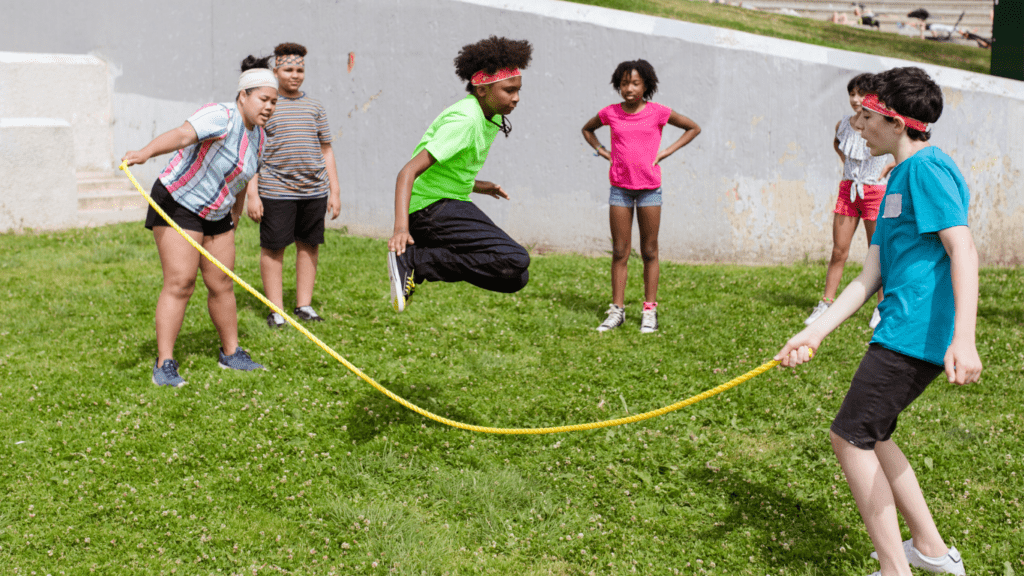Understanding the Role of Play in Emotional Development
Play is a critical element of a child’s growth. It shapes their emotional landscape and influences their interactions with the world.
The Basics of Emotional Development in Children
Emotional development in children involves recognizing and managing emotions, forming relationships, and feeling empathy. Children’s ability to understand their own emotions and others’ emotions grows rapidly during early childhood.
This growth is fundamental to forming secure attachments, which serve as a foundation for future emotional health.
Several factors influence emotional development in children. These include their home environment, relationships with caregivers, and the opportunities they have to interact with peers.
Consistent and positive interactions with caregivers promote emotional security. When children feel secure, they’re more likely to explore their environments and engage in play, which further supports emotional development.
Types of Play and Their Impact
Different types of play serve various functions in emotional development:
- Imaginative Play: Engaging in pretend play allows children to explore various emotions and scenarios safely. They can act out roles, express feelings, and understand different perspectives. This type of play enhances empathy as children learn to navigate various social situations.
- Social Play: When children play with peers, they learn essential social skills such as sharing, negotiating, and cooperating. Social play helps children understand social norms and develop friendships, which are vital for emotional wellness.
- Physical Play: Activities like running, jumping, and climbing help children release energy and reduce stress. Physical play also supports the development of motor skills and overall physical health, contributing positively to emotional well-being.
- Structured Play: Games with rules, such as board games or sports, teach children about boundaries and self-regulation. Structured play helps children manage frustrations and develop patience as they take turns and follow instructions.
By engaging in various types of play, children build a comprehensive set of emotional skills. These experiences lay the groundwork for emotional intelligence, enabling children to navigate life’s complexities with resilience and empathy.
Benefits of Play in Emotional Skills Development

Play significantly shapes children’s emotional skills. It provides a foundation for understanding and managing emotions and forming essential social bonds.
Building Empathy Through Play
Children build empathy by engaging in role-playing and imaginative games. For example, when they pretend to be someone else, they learn to see situations from different perspectives.
Cooperative play, like team sports or group activities, encourages them to consider others’ feelings and needs. According to a study in “Developmental Psychology,” children who participate in cooperative play show higher levels of empathy and prosocial behavior.
Enhancing Communication Skills
Kids enhance communication skills through interactive play. Activities like:
- storytelling
- puppet shows
- social games
Require them to articulate thoughts and emotions clearly. These activities help them understand non-verbal cues and body language.
According to research published in “Early Childhood Education Journal,” children involved in interactive play have better verbal and non-verbal communication skills, enabling them to express themselves more effectively.
Play and Emotional Resilience
Children develop emotional resilience through play. It helps them navigate various challenges constructively.
Developing Coping Mechanisms
Play cultivates vital coping mechanisms. When children encounter challenging scenarios during play, like losing a game or resolving a conflict, they practice managing disappointment and frustration.
For example, role-playing and imaginative play allow them to explore different outcomes and consider alternate strategies. This repetitive problem-solving strengthens their ability to cope with real-life stressors.
According to the American Academy of Pediatrics, unstructured playtime promotes resilience by providing a safe environment for children to experience and resolve conflicts independently.
Play as a Stress Reliever
Engaging in play acts as a natural stress reliever for children. Physical activities like running, jumping, and climbing release endorphins, which improve mood and reduce anxiety. Social play, including games with peers, offers emotional support and fosters a sense of belonging.
Furthermore, creative play activities like drawing and dancing provide an outlet for self-expression, allowing children to process their feelings non-verbally.
The National Institute for Play identifies this function of play as crucial for maintaining mental well-being, as it aids children in managing stress and emotions effectively.
Promoting Emotional Development Through Guided Play
Guided play offers a structured yet flexible approach to foster children’s emotional development. Children benefit from participating in activities that are both enjoyable and educational.
The Role of Parents and Educators
Parents and educators play crucial roles in guided play. They provide direction and create opportunities for development. Setting up scenarios, offering gentle guidance, and engaging in play are key responsibilities.
For instance, a teacher might create a role-playing scenario where children pretend to manage a store, helping them understand empathy and cooperation. Similarly, parents can guide imaginative play at home to strengthen emotional bonds and teach conflict resolution.
Creating Supportive Play Environments
A supportive play environment is essential for emotional development. Spaces should be safe, inclusive, and stimulating. Arrange diverse materials that encourage creativity and interaction.
For example, having building blocks, costumes, and art supplies available can prompt various forms of play that promote emotional intelligence. Ensure the environment supports both individual and group activities. If the setting feels secure and engaging, children are more likely to explore emotions through play.

 Hazeliin Davidsoninn, the founder of Toddler Health Roll, is an insightful article writer with a passion for children's health and well-being. Her writing reflects a deep understanding of the challenges parents face when raising toddlers, offering practical advice grounded in the latest pediatric research. With a keen eye for detail and a compassionate approach, Hazeliin's articles provide parents with the tools they need to nurture their children's physical, mental, and emotional health.
Beyond her expertise in child health, Hazeliin's writing also delves into the complexities of toddler nutrition, travel with young children, and effective parenting strategies. Her dedication to sharing valuable knowledge with her readers has made Toddler Health Roll a trusted resource for parents seeking guidance on raising happy, healthy toddlers.
Hazeliin Davidsoninn, the founder of Toddler Health Roll, is an insightful article writer with a passion for children's health and well-being. Her writing reflects a deep understanding of the challenges parents face when raising toddlers, offering practical advice grounded in the latest pediatric research. With a keen eye for detail and a compassionate approach, Hazeliin's articles provide parents with the tools they need to nurture their children's physical, mental, and emotional health.
Beyond her expertise in child health, Hazeliin's writing also delves into the complexities of toddler nutrition, travel with young children, and effective parenting strategies. Her dedication to sharing valuable knowledge with her readers has made Toddler Health Roll a trusted resource for parents seeking guidance on raising happy, healthy toddlers.
